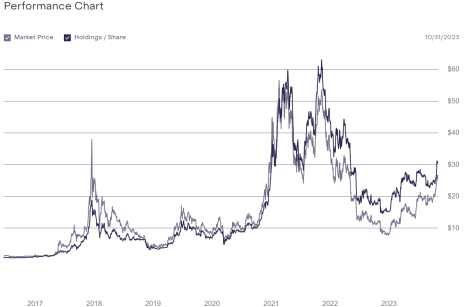Earlier this year, a D.C. appellate court handed down a ruling that found the SEC’s rejection of Grayscale Bitcoin Trust’s (GBTC) application to convert to a spot Bitcoin ETF to be “capricious.” In and of itself, that ruling doesn’t force the SEC to grant the application, but it does force them to reconsider the application on the merits. The agency had the opportunity to appeal the ruling but declined to do so. Now, that deadline has passed, and an upcoming closed-door meeting at the SEC could open up an arbitrage trade in Bitcoin. (An arbitrage trade is an investment that relies on a pricing mismatch, like shares of a company that is being acquired trading for less than the acquisition value due to the time anticipated to complete the merger or risk of regulatory intervention.)
In the August opinion, Circuit Judge Neomi Rao opined that “the Commission failed to adequately explain why it approved the listing of two bitcoin futures ETPs [(exchange-traded products)] but not Grayscale’s proposed bitcoin ETP. In the absence of a coherent explanation, this unlike regulatory treatment of like products is unlawful. We therefore grant Grayscale’s petition for review and vacate the Commission’s order.”
In essence, the court failed to see a distinction between exchange-traded funds that rely on Bitcoin futures trading (like the ProShares Bitcoin Strategy ETF (BITO), or the Valkyrie Bitcoin and Ether Strategy ETF (BTF), which have SEC approval) and an investment like GBTC (which holds Bitcoin directly), all of which offer investors exposure to the price performance of Bitcoin.
[text_ad]
Consequently, the SEC has scheduled a closed-door meeting for November 2, and one notable topic of discussion is “Resolution of litigation claims,” which has Bitcoin bulls thinking approval of a spot Bitcoin ETF could be imminent.
Should the SEC ultimately approve the application (more on that later), there’s potential for an arbitrage trade in Bitcoin based solely on GBTC’s historical discount to net asset value (NAV), which is the difference between the market price of the Trust and the market value of the underlying Bitcoin holdings.
As you can see in the chart from Grayscale below, for the last few years, GBTC has traded with a 10-20% discount to NAV, although that figure reached as high as 40% over the summer. As of October 31, the fund was trading at a 13.7% discount to NAV.
Should the SEC ultimately approve the ETF application, or signal that it is likely, GBTC could close some or most of that gap, even if Bitcoin itself does not rally on the news.
Flat (or rising) Bitcoin prices would still allow for double-digit appreciation in the fund on what is ultimately a binary event.
For context, let’s look at the Sprott Physical Gold Trust (PHYS). Both funds invest solely in the underlying asset and hold it in custody for unit holders. Each underlying asset also presents challenges for investors. In the case of gold, buying or selling large quantities of physical gold is difficult and time-consuming, as is keeping it secure. Bitcoin, on the other hand, presents similar security challenges and added technical risks, but is far easier to trade in and out of.
PHYS trades at a 1% discount to NAV as of this writing, compared to GBTC’s 13.7% discount.
The Rationale Behind the Arbitrage Trade in Bitcoin
Conversion to a spot ETF could allow large market participants to take actual delivery of the underlying Bitcoin, or, from a risk management standpoint, to consider shares of the fund as actual Bitcoin holdings to trade or hedge against.
This could rapidly close the gap between the NAV and the market price of the fund to a range more consistent with PHYS, which would represent around a 10% premium to where shares are trading now.
Additionally, Bitcoin itself is likely to rally on promising news, if only in the near term, which offers added upside in addition to the NAV discount.
Risks of the Arbitrage Trade in Bitcoin
As mentioned above, the court order only compels the SEC to revisit the application, not to approve it.
Should the SEC deny the application on other grounds with surer legal footing, not only would GBTC retreat closer to the NAV discount it was trading with throughout the summer, but the price of Bitcoin would also likely fall on the news.
One of the key speculative elements of Bitcoin is the prospect of mass adoption, wherein large institutions and retail investors will make a mad dash to invest in the “digital gold” should they be granted a green light by regulators.
The major risk there is that … they simply don’t. Cryptocurrency investors pinning their hopes on widespread adoption have driven the price of Bitcoin up 108% year to date, based on some combination of historical prices, the abhorrent relative performance over the past two years, and the prospect that institutional investors are just around the corner.
Approval of an ETF without the expected buying pressure could easily let some air out of this year’s Bitcoin rally and lead to stagnating or declining prices.
That said, if you are a Bitcoin bull, the NAV discount of GBTC offers additional upside beyond the price performance of the token itself.
[author_ad]


